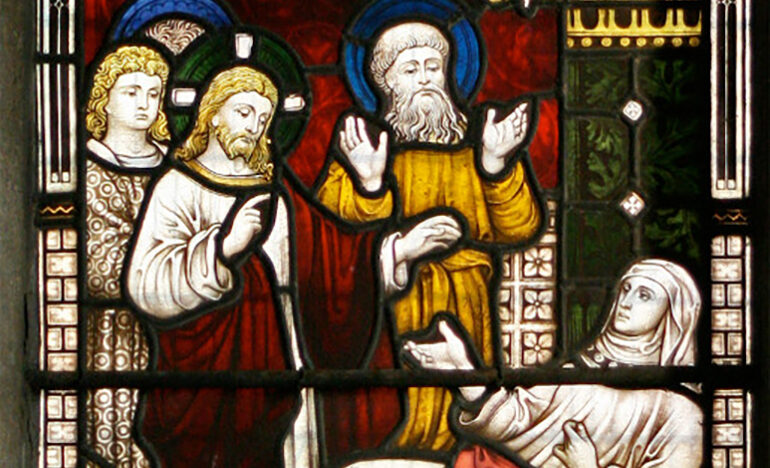The ‘Why’ Conundrum, an Assembling God’s Puzzle video

By Fr. Garry Richmeier, CPPS.
There are many puzzle pieces that make up our lives. Some, like our gender or race, we’ve been dealing with all our lives. But God throws many more puzzle pieces into our lives every day, like new events or new relationships.
A very human reaction to all of that is to ask the question “Why?” It’s not a bad question. If scientists didn’t ask why things work the way they do, we would not progress scientifically or technologically. I was drawn to the counseling profession because I was curious why people (including myself) work the way they do.
But sometimes we get into a repetitive dynamic of asking “why” when there is no satisfactory answer. This often happens with negative or unpleasant things that come into our lives. We ask “Why did I get ill?”, “Why did my loved one have to die?”, or “Why haven’t I met the right person to marry?”
“Why?” is the basic question Job asks in The Book of Job. The whole book describes how Job and his three friends keep trying to figure out why all the calamities happened to him, but they never come up with a good answer. When God finally speaks at the end of the book, God doesn’t even give a satisfactory answer.
“Why?” is the basic question Job asks in The Book of Job. The whole book describes how Job and his three friends keep trying to figure out why all the calamities happened to him, but they never come up with a good answer. When God finally speaks at the end of the book, God doesn’t even give a satisfactory answer.
Not finding an answer — or a satisfactory answer — often doesn’t stop us from asking the question over and over again. We can resemble a hamster running on the wheel in its cage, running and running and never getting anywhere. We ask “Why is this happening?” and we don’t get an answer. “But it shouldn’t be this way,” we think, but it is. “But why?” we repeat. And on and on it goes. It becomes a tiring feedback loop, or vicious circle, which produces a lot of anxiety, fear and depression, and doesn’t get us anywhere.
Sometimes we think that if we could find an answer, it would all make sense, and we would feel better. We like to be in control, and knowing why something is the way it is is a form of control.
We also are fearful of uncertainty, and we want to know life is not just a crap shoot or a flip of a coin. We believe that knowing “why” can allay our fears. So we may keep trying to find out “why” even when there are no answers.
It can be helpful to put aside the “why” questions a little bit. First of all, because it feels better to give ourselves a break from trying to figure out what is not able to be figured out. Also, because pursuing the “why” question doesn’t help us deal with the situation as it is. Even if we found the answer as to why the situation is as it is, we would still be in the same place, having to deal with the situation. And thirdly, trying to figure out “why” uses much of our emotional and psychological energy, which could better be used to figure out how to deal with the situation at hand.
How does one step away from the “why” question a little? We can accept that we will naturally ask “why” when things happen because we are human. But we can notice when asking the question becomes a repetitive trap. We can also ask ourselves “If I knew the answer to ‘why,’ would that help me in any way, or would I still be in the same boat?” Then we can shift our focus/energy from the “why” question to the question “What now?”
“What now?” is a more constructive question, and one which will more likely have an answer. The answer to that question will come from you, and so will be more satisfying and will have a chance of getting you somewhere.
And finally, as in all things, we can draw on our faith and trust in God being at work in our lives. Many things have come into our lives and we haven’t known the reason why. But God has gotten us to this point anyway. It’s a good bet that God will continue the same way in the future, whether or not we know why. That more than anything may help us not get caught up in the tortuous and never-ending dynamic of asking a question to which we can’t find an answer.
All of the videos in this series can be found here: Assembly God’s Puzzle.
Never miss an article published on the Renewal Center website: Sign up to receive our newsletters.
[Fr. Garry Richmeier, a Precious Blood priest and spiritual director, holds a Master’s of Divinity Degree from St John’s University in Collegeville, Minnesota, and a Master’s of Counseling Psychology degree from the University of Missouri-Kansas City. He is a licensed professional counselor and a licensed marriage and family therapist.]
Photo 54351489 / Why © Charlieaja | Dreamstime.com Illustration 186385711 © StockSupply | Dreamstime.com
We’d Like to Hear from You!
We’d like to know what you think about this article. Send us a comment using the form below. Do you have a suggestion? Is there something you want to learn more about? Send us a note.
Related

Making a Banner for Lent Part 2
A Coffee with Padre Video
Fr. Timothy finishes his Lenten banner and continues his reflections on how colors and materials become potent symbols that bring the Lenten season alive. The final banner serves as a visual reminder of our spiritual journeys.

Lent Video Four — Guided Meditation: ‘Traveling in the Dust of the Rabbi’
In this video, Fr. Ron reads the Gospel, Mark 1:29-34, for you and then leads you through a guided meditation, taking you deeper into that story. He calls this experience “an example of traveling in the dust of the rabbi.”
Categories
Assembling God's Puzzle Coffee with Padre Cooking & Spirituality Encounters of the 4th Kind Family Matters Reflections on the Eucharsitic Prayers Spiritual Resources Taize Prayers The Contemplative Life Traveling with Pilgrims of Hope Uncategorized Videos Week of Prayer for Uhristian Unity When you need a little help
